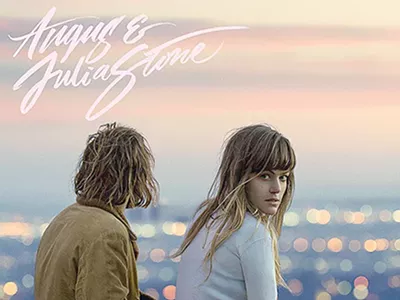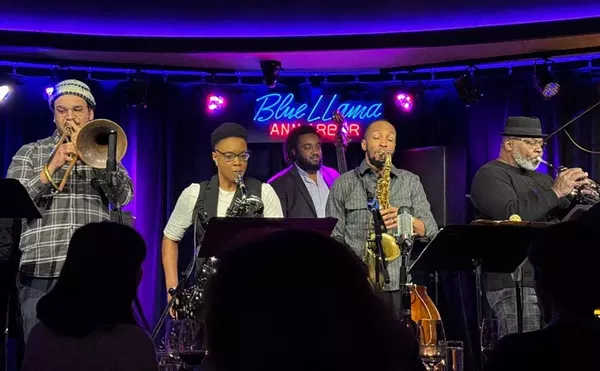Despite the fact that the world's eyes were on Detroit in the 1990s and beyond, Carter finds it incredibly sad that no female rappers broke big. "In the late 1990s, you get Eminem," she says. "D12 was trying to do something. In the late 2000s to current, you've got your Danny Brown and your Royce da 5'9". But no women. All of these men get the press, all these men get the voice. At the same time, all these women are rapping, making records, doing shows, doing collaborations, making projects, writing ghost lyrics for other MCs, so ... you've got this sort of underground culture. Then poetry comes around 2002. The poetry era softened up the urban thing. It provided an alternative for the urban listener. If you were into hip-hop but you didn't want to hear about gangsters and strippers and you were about something — you were going to college and had other things in mind — then you were listening to poetry. A lot of these rappers were going to the poetry side."
So that's the history. Female rappers did manage to make a name for themselves locally over the past few decades — people like Miz Korona, Smiley, and Boss. But it's been hard. The music industry is a minefield to negotiate under the very best of circumstances. For a woman in hip-hop, for someone who doesn't want to get near-naked and rap explicit lyrics, it's a nightmare. Mae Day says that it's still very much that way.
"I've been in front of the executives and the A&Rs who have plainly told me that they can't sign me because I'm a female," she says. "These are words that came out of their mouth. 'Females don't sell.' It had nothing to do with my music — these are people who had been fans of what they heard or what they saw, but the fact that I was a woman is what 'held me back.' It's getting better because a lot of these up-and-coming female MCs or the women of hip-hop that I see — they have men or money behind them that believe in them. Somebody had to take that chance and stand for it. If you find that, you're blessed. Otherwise, it's still hard. People are torn about how they feel about Iggy Azalea, but the fact that she has a hit is a good thing because now we know that Nicki isn't just a fluke. If somebody else has some major success, that'll help warm up for women."
Smith says that she deals with misogyny day-to-day. "You have the male counterparts saying, 'Maybe if you dumb it down' or 'Maybe if you were less intimidating,' and that comes from the female audience too," she says. "A lot of them would prefer that you become something they can idolize. Something that they aren't themselves most of the time. Escapism — anything that can take them away from the reality of what they are. That's where the misogyny lies."
According to Jones, it can get a little sinister at times for a woman in the music industry. "Of course, having to deal with business, there's sometimes a sexual motive," she says. "I feel like we're being overlooked and there's an overflow of men. If there are women, there's always just one. The token woman. It's not like a real mixture. You don't see Insite, myself, and Miz Korona."
Such is the enormous level of talent on display from the Detroit ladies, nobody should ever have to feel like a "token woman." So how does one deal with that sort of bullshit?
"You just do it," says Jones. "You can choose to compromise, but I think the whole reason I'm driven to be an artist is that I think I have something to say, and I believe it's important that my voice says it. I can't change what I think is important."
She's not kidding. After all, Jones is a woman who kick-started an initiative at 5E to help process the backlog of 11,000 untested rape kits in Detroit. That's important. Meanwhile, Carter's current initiative is Women in Hip-Hop.
"That's a ... collective of women — scholars, academics, B-girls, DJs, MCs, poets, graffiti artists, community activists, vocalists, musicians — and so what we're doing right now is performing together at various universities, conferences, festivals, and that sort of thing," she says. "We mentor young people, and many of us develop our own curriculum for working with young people and adults. We do personal and professional development with women. Also business skills. I'm a photographer, and I [shoot] video, so we have media skills too."
This isn't an ego thing. These wonderful, beautiful, and talented women aren't in it to polish their own delicate sense of self-worth. These are people who are using their musical ability, plus their drive to give back to their community. All five of the women interviewed here, and many more besides, are gifted hip-hop musicians. They are all deserving of your attention. Great things are happening, but as a society we still have a long way to go.
"I'm 42," says Carter. "I grew up with hip-hop. I remember hip-hop infusing technology and electronic music. I remember initially when hip-hop was new, that the whole concept of rapping on a record was revolutionary. If you look at the recorded music, it wasn't necessarily intellectual content. On a deeper level, people were talking about the ills of society, but a lot of it was party music. A lot of it was talking about having fun and partying. At the time, when I was young, those types of lyrics didn't feel misogynistic, but having learned about misogyny since, I can actually see right now how a guy talking about having a bunch of girls is misogyny."
Yep. Cut that shit out, fellas. — mt






